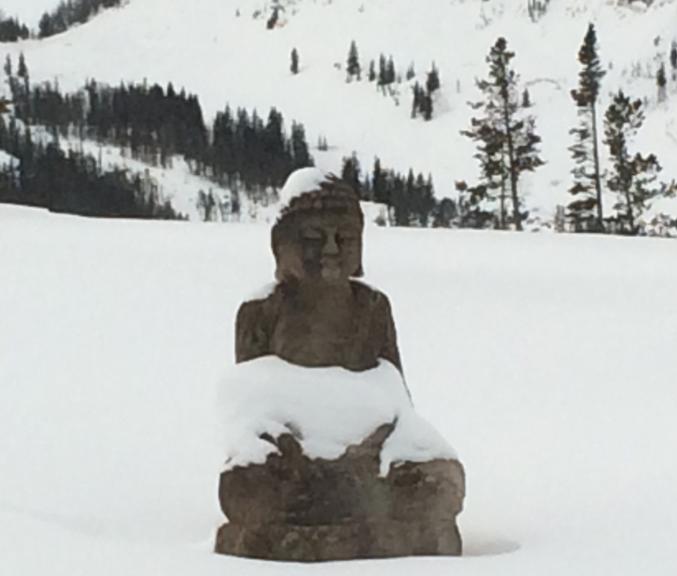Update 6:49 p.m.:
These Darien High School sports teams had their Saturday events postponed to dates yet to be determined:
- Darien Boys Hockey vs. Trumbull at The Rinks at Shelton
- Darien Wrestling at Valley of Champions
- Boys, Girls Indoor Track & Field at Wilton meet
Update 6:39 p.m.:
Cancelled on Saturday, according to WFSB-TV, Channel 3:
- Liberation programs in Stamford and Bridgeport
- The University of Bridgeport Stamford campus
- Connecticut Counseling Centers Norwalk location
- Norwalk Community College
Update 6:20 p.m.:
All Diocesan events for the Catholic Diocese of Bridgeport this weekend are canceled, the Diocese tweeted.
Update 5:15 p.m.:
UConn tweets: “All classes on Saturday, Jan. 23 at UConn Stamford and UConn Avery Point are canceled. Both campuses will be closed.”
Update 5:11 p.m.:
If there’s a power outage, here’s how to handle the food, excerpted from this Web page from the American Red Cross (go to that page for more information):
Perishable foods including milk, meat and eggs should not be stored above 40 degrees for more than 2 hours.
If a power outage is 2 hours or less, you don’t need to be concerned, but you should know how to save your food when the refrigerator is out for longer periods of time. Being prepared can help.
By planning ahead, you can save your perishables and safeguard your family’s health.
- One or more coolers. Inexpensive styrofoam coolers can do an excellent job.
- Shelf-stable foods, such as canned goods and powdered or boxed milk. These can be eaten cold or heated on the grill.
- A digital quick-response thermometer. A digital thermometer should be a necessity in your kitchen anyway. With these thermometers you can quickly check the internal temperatures of food for doneness and safety.
Update 5:01 p.m.:
Darien Library will be closed Saturday but open Friday night according to this announcement:
Darien Library will be closed Saturday in view of the likelihood of extreme snow and wind conditions, in order to assure the safety of our staff and patrons.
We will be open today as usual, and the evening movie, — The Martian — will be shown at 6:30 and 8:45 p.m. As well, please join us tonight from 6 to 8 p.m. for Bill Fields’ art reception.
Update 4:58 p.m.:
The Connecticut Department of Public Health warns against carbon monoxide hazards during power blackouts:
During natural disasters such as hurricanes, blizzards, ice storms and floods when electricity is off for long periods of time, more and more people are turning to other sources of power such as gasoline-powered generators, charcoal grills, gas ovens and fireplaces/wood stoves to heat their homes. BE AWARE of the danger of carbon monoxide (CO) poisoning from improper use of these items.
The number of CO poisonings has been rising each year. From 1999-2006, 334 people died from generatorrelated CO poisonings, many after major storms knocked out power. This includes the 2000 North Carolina ice storm, the 2004 Florida hurricanes, and the 2005 Katrina and Rita hurricanes on the Southern coast states.
For tips and more information, see this Web page.
Update 4:55 p.m.:
The Darien Girls Lacrosse Team announced on Twitter at 4:35 p.m. that “Sono high school league play is cancelled tomorrow [Saturday] 1/23.”
Update 4:52 p.m.:
The Royle School Parent Teacher Organization announced at 4:43 p.m. that the scheduled Sound Tigers Choral event scheduled for Saturday has been cancelled. Here’s the announcement:
Due to the EXTREME weather forecast, The Sound Tigers Chorale Event tomorrow will be CANCELLED. The Sound Tigers game will most likely still happen. We have not worked out all the details with the Sound Tigers, but anticipate the following:
1. Anyone wishing to still attend tomorrow’s game, will still have tix at WILL CALL.
2. They will most likely reschedule the Chorale event and hopefully most people who bought tix will be able to re-attend.
3. Anyone who cannot make either option above, they will offer alternative options to other future games.
Contact John Josef with questions – C203-644-8635
Update 4:47 p.m.:
Darien Public Schools has cancelled an SAT exam for this weekend and school property will be closed for all activities on Saturday and until noon on Sunday, the school district said on its website:
“All Darien Public School buildings are closed Saturday, Jan. 23, 2016. All activities and athletics (home and away)are cancelled. The SAT exam held at Darien High School is also cancelled. The school buildings are scheduled to reopen for normal use on Sunday, Jan. 24, 2016 at 12:00 p.m.”
Original article:
Batten down the hatches for what forecasters are predicting will be 5 to 9 inches of snow in Darien (maybe more) low temps and relatively high winds. This article will be updated as more information comes in.
(The National Weather Service forecast specifically for Darien is below, along with an announcement from the AAA about safe driving.)
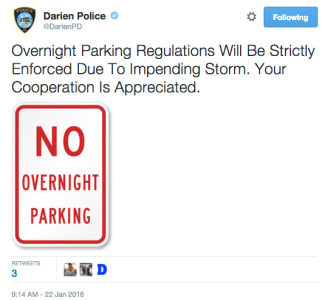
Darien police issued this announcement at 9:44 a.m.
Darien police have issued a brief announcement on Twitter (see the image attached to this article) that the ban on overnight parking will be strictly enforced because of the storm (snow plows gotta plow).
And remember, if the electricity goes out for a while, Darien Library has an electric generator and the management of the two Interstate 95 rest stops in Darien welcomes anyone to stay in their 24-hour, seven-days-a-week atrium — they’ve got generators, too.
Sign up for Darien’s CodeRED service here to get phone or text announcements.
Storm Prep Tips from Eversource
Update: 1:11 p.m.: Eversource has posted these tips on its website:
With the first signs of an approaching hurricane or winter storm, make sure we have your up-to-date contact information, so we can get in touch before, during and after the storm.
- You can update your telephone number and email address online by logging into your account.
- You can sign-up to receive Storm Text Updates from us throughout a major storm.
Home Use Medical Devices
If you are a home medical device user, it is important that your device works during a power outage and that you have a plan in place to ensure you know what to do.
By completing the U.S. Food and Drug Administration booklet with the help of a healthcare professional, “Home Use Devices: How to Prepare for and Handle Power Outages for Medical Devices that Require Electricity,” you will have an established plan to obtain and organize your medical device information, take necessary actions so that you can continue to use your device, have the necessary supplies for the operation of your device, and know where to go or what to do during a power outage. Remember to update this booklet as your treatment, doctors, caregivers, or personal contacts change.
Storm Tips
Here are some other preparations that you can make before a storm hits.
- Build an Emergency Kit with essential items to meet the unique needs of your family. To help build your kit, the Federal Emergency Management Agency (FEMA) has a detailed checklist available.
- Stock up on non-perishables, such as canned goods and pet food, and make sure you have adequate medical supplies and prescriptions for yourself and your pets.
- Pick up some paper goods: paper plates, paper towels, plastic ware.
- Turn the temperature controls on your refrigerator and freezer to the coldest setting to keep food cold in the event of a power outage.
- Fill several large containers with water for drinking and also fill the bath tub so you have water to flush your toilet.
- Keep flashlights, batteries, candles and matches on hand and make sure they are available throughout the house.
- Have a battery-powered radio available.
- Make sure you have fresh batteries that are the correct size for the flashlights and radio. Be sure there’s a first aid kit in the house.
- Fill your car with gasoline since you don’t know where you’ll have to go. Your car can also be a good place to get warm, as long as you keep it well ventilated and don’t go to sleep while it is running.
- Be prepared to cook outside. You can use charcoal or propane grills or even a camping cook stove if the power goes out. However, never bring grills inside!
- Have extra gasoline on hand if you own an electric generator.
- Place a list of emergency numbers near a phone (landline, since cordless phones don’t work during outages) and in your mobile phone: Red Cross, fire, police, family doctor.
- Invest in an Uninterruptible Power Supply (UPS). During a momentary power outage, the UPS will continue to provide power to your personal computer. (A UPS is not designed to operate a computer indefinitely, only long enough to allow users time to save their work and shut down properly.)
Hurricanes & Other Severe Weather
If a severe weather or hurricane warning is put into place, and the storm becomes imminent, take the following precautions. Some of the items below can be done well in advance of a storm, while others should be done a day or two a major storm is forecast to impact your area.
- Tape, board or shutter windows and glass doors.
- Secure all outdoor objects that could become airborne by high winds.
- Tie down mobile homes or moored boats, or move them to a safe location.
- Wedge sliding glass doors to prevent them from lifting from their tracks.
- Load up a cooler with ice and food you can use during the first hours of an outage.
- In the winter, close off unused rooms to conserve heat. Open curtains and shades to let sunlight in; close them at night. Stock up on firewood.
- Plug sensitive computer and electronic equipment into surge suppressors or surge protectors. A surge suppressor diverts excessive electrical energy away from your equipment to an electrical “ground” where it disappears without doing any harm.
National Weather Service Issues Hazardous Weather Statements
Here they are — but these announcements don’t seem that unusual for a winter storm (we’ve added quotes on particularly salient points from each announcement; you can click through to the full statement):
- Coastal Flood Advisory in effect from Jan. 23, 10 a.m. until Jan. 23,2 p.m. — MINOR COASTAL FLOODING EXPECTED SATURDAY […]
TIDAL DEPARTURES...1.5 TO 2 FT ABOVE ASTRONOMICAL TIDES SATURDAY MORNING AND 2 1/2 TO 3 1/2 FEET ABOVE NORMAL ASTRONOMICAL TIDES SATURDAY NIGHT.
- Winter Storm Watch in effect from January 23, 06:00 AM EST until January 24, 01:00 PM EST
...WINTER STORM WATCH REMAINS IN EFFECT FROM SATURDAY MORNING THROUGH SUNDAY AFTERNOON...
* IMPACTS...HAZARDOUS TRAVEL DUE TO REDUCED VISIBILITIES AND SIGNIFICANT SNOW ACCUMULATIONS. BLOWING AND DRIFTING OF SNOW WITH NEAR BLIZZARD CONDITIONS ARE EXPECTED DUE TO STRONG WINDS.
- Coastal Flood Watch in effect from January 23, 09:00 PM EST until January 24, 01:00 AM EST
IMPACTS...MINOR COASTAL FLOODING SATURDAY MORNING. MINOR TO MODERATE COASTAL FLOODING POSSIBLE SATURDAY NIGHT WITH MORE WIDESPREAD FLOODING OF VULNERABLE SHORE ROADS AND/OR PROPERTIES. ISOLATED SHORELINE STRUCTURAL DAMAGE MAY BE OBSERVED. A COASTAL FLOOD WARNING MAY BE NEEDED FOR SATURDAY NIGHT.
National Weather Service Forecast for Darien
As of 12:56 a.m., Friday:
State Police Say ‘Stay Safe’ with These Tips
Posted on Twitter:
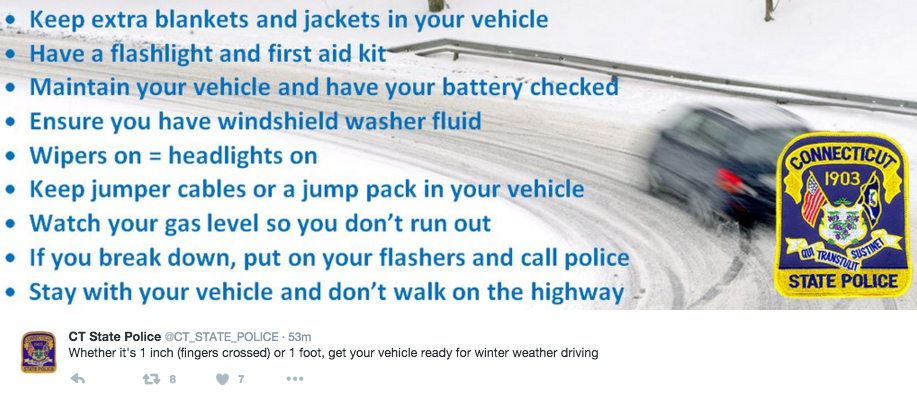
Posted on Twitter
Another helpful post from Connecticut State Police on Twitter:
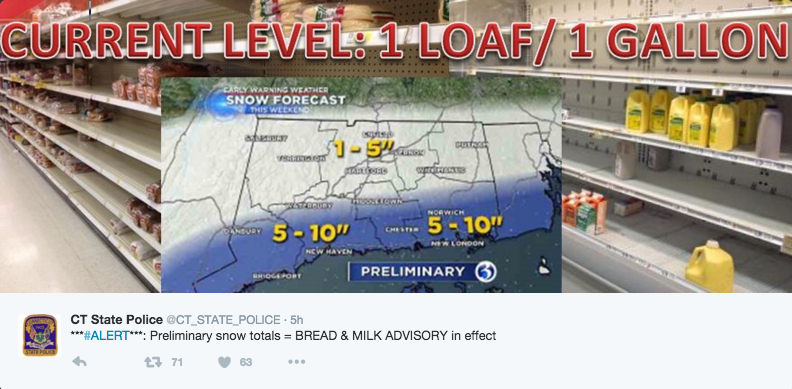
An announcement from the Automobile Association of America:
AAA Urges Driver Caution
as Major Storm Barrels Toward East Coast
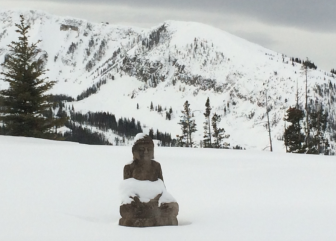
Remember to stay calm during incidents of heavy snowfall. Be like Buddha (but don\’t let snow accumulate on you).
As a major winter storm approaches the East Coast this weekend, AAA urges motorists to be prepared and to remain cautious if driving.
That’s because dangerous winter storms and bad weather are factors in nearly half a million crashes and more 2,000 road deaths every winter, according to the latest research by the AAA Foundation for Traffic Safety
According to a new AAA Foundation research report entitled Motor Vehicle Crashes, Injuries and Deaths in Relation to Weather Conditions, about 46% of crashes involving bad weather take place in the winter, making this the worst time of year for driving in treacherous conditions.
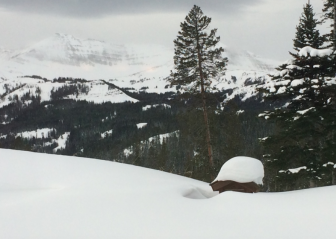
We haven’t seen this in Darien for a while — the snow may pile up a bit (photo from the far, far, far western edge of town, very far).
And the highest proportion of crashes involving bad weather happen overnight from 6 p.m. to 5:59 a.m., when visibility is limited and roads are most likely to freeze. Previous research also has found that the rates of fatal crashes are higher during the first snowfall of the year than on subsequent days with snow.
“This weekend’s winter storm has great potential to create havoc on major roads used by millions of drivers every day,” said Fran Mayko, AAA Northeast’s spokeswoman in Connecticut. “If you do ven-ture out, drivers braving the bad weather should remain cautious and slow down to keep from being in a crash.”
The study by the AAA Foundation, the research arm of AAA, analyzed bad weather and crashes throughout the year.
The study found rain, snow, sleet and fog are factors in more than 1.1 million po-lice-reported crashes, 425,000 injuries and 5,100 traffic deaths per year. The study did learn however that crashes in bad weather are generally less severe than crashes during clear weather.
AAA recommends the following tips to remain safe while driving in snowy and icy conditions:
* Stay home. If you really don’t have to go out, don’t. Even if you can drive well in the snow, not everyone else can.
* Drive slowly. Everything takes longer on snow-covered roads. Give yourself time to maneuver by driving slowly.
* Accelerate and decelerate slowly. Apply the gas slowly to regain traction and avoid skids. Don’t try to get moving in a hurry; take time to slow down for a stoplight. Remember: It takes longer to slow down on icy roads.
* Increase your following distance to 8 to 10 seconds. This increased margin of safety will pro-vide the longer distance needed if you have to stop.
* Know your brakes. Whether you have antilock brakes or not, keep the heel of your foot on the floor and use the ball of your foot to apply firm, steady pressure on the brake pedal.
* Don’t stop if you can avoid it. There’s a big difference in the amount of inertia it takes to start moving from a full stop versus how much it takes to get moving while still rolling. If you can slow down enough to keep rolling until a traffic light changes, do it.
* Don’t power up hills. Applying extra gas on snow-covered roads just starts your wheels spin-ning. Try to get a little inertia going before you reach the hill and let that inertia carry you to the top. As you reach the crest of the hill, reduce your speed and proceed downhill slowly.
* Don’t stop going up a hill. There’s nothing worse than trying to get moving up a hill on an icy road. Get some inertia going on a flat roadway before you take on the hill.
AAA handles an average of 600,000 emergency roadside assistance calls nationally per week in the winter with the most common problems being dead batteries, extractions, towing and flat tires. AAA recommends keeping the following items in your “emergency kit” for winter driving:
* Bag of abrasive materials such as sand, salt or cat litter
* Snow shovel
* Flashlight
* Gloves or mittens
* Ice scraper and snow brush
* Jumper cables
* Blanket
* Warning flare or triangles
* Cellular phone and emergency charger
* Food and water
* First aid kit
AAA Northeast is a not-for-profit auto club with 61 offices in Rhode Island, Massachusetts, Connecticut, New Jersey and New York providing more than 5.2 million local AAA members with travel, insurance, finance, and auto-related services.

